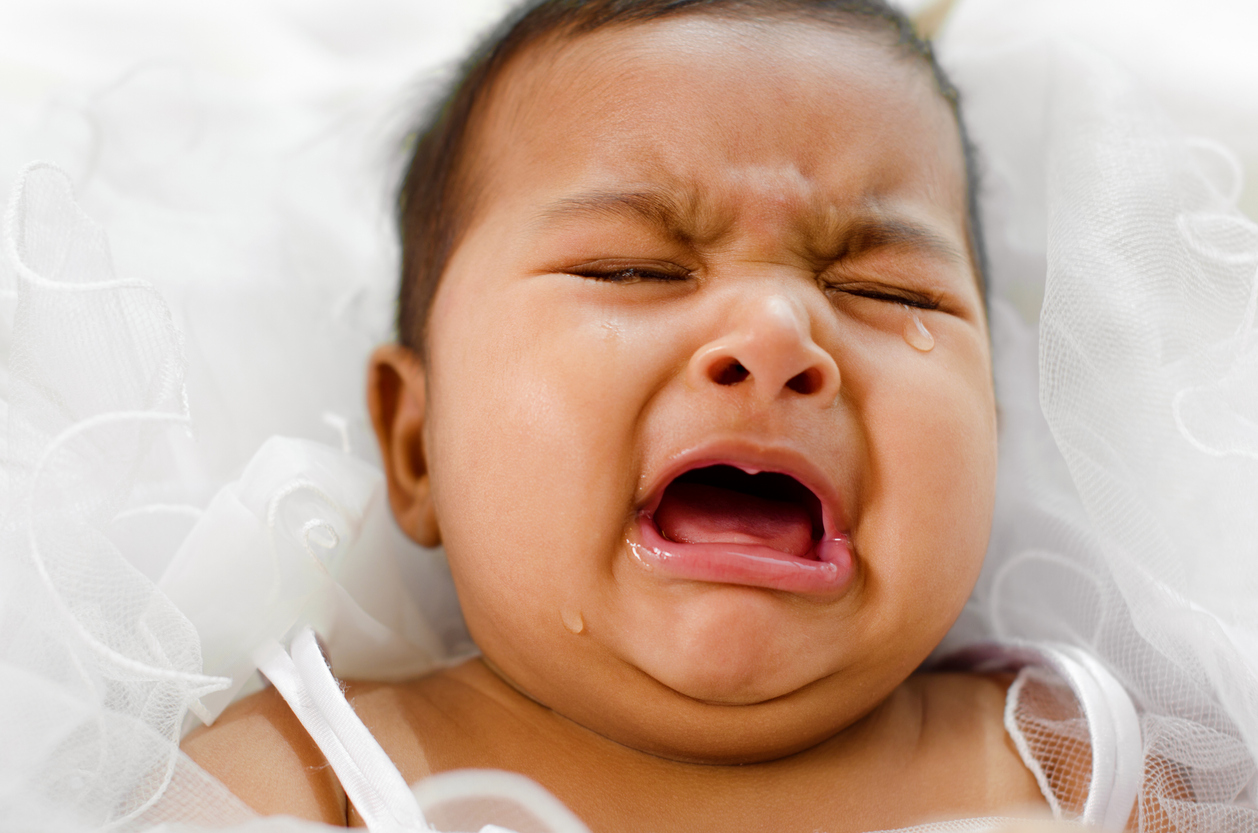
A baby with colic can cry for what feels like forever to a worried parent. No parent enjoys hearing their child wail for no apparent reason. What's worse is that when a baby cries because they are hungry, bored, or cold or they need a diaper change, you can take immediate action to help calm and soothe your baby. But when a baby has colic, you can soothe, cradle, sing to, and do everything in your power to stop your baby from crying, and nothing works. You just have to wait it out, which is easier said than done.
More from MamásLatinas: Tips to help you calm your baby down
What exactly is colic? According to the Mayo Clinic, "Colic is frequent, prolonged and intense crying or fussiness in a healthy infant. Colic can be particularly frustrating for parents because the baby's distress occurs for no apparent reason and no amount of consoling seems to bring any relief." OK, so even though colic isn't completely understood by the medical community, it's still helpful to know as much about it as possible when you have a colicky baby, because otherwise you can go into a spiral of despair and feel like you are doing something wrong. Let's get into what is known about colic. Also, remember that colic affects otherwise "healthy" babies—key word here is healthy, which means it's not dangerous—and it will pass. Promise!
What causes baby colic?

Colic is one of those mystifying conditions that medicine cannot yet explain. Even though no one really knows what causes colic, there are theories. These theories include:
- Babies' digestive systems aren't fully developed.
- They may have food allergies or be lactose-intolerant.
- They are being fed too much.
- They aren't being burped enough.
Again, these are all theories, so take them with a grain of salt.
How long does baby colic last?

According to Johns Hopkins Medicine, "It is most common during the first 6 weeks of life. It usually goes away on its own by age 3 to 4 months." In the grand scheme of things, that's not a long time, but when you are going through it, time feels like it has slowed to a crawl. This is when it's good to remind yourself that colic is only temporary.
What are the signs of baby colic?

Some of the signs that your baby might have colic include:
- They cry for no apparent reason.
- The fits of crying seem to happen at around the same time, usually in the evening.
- The crying is different from their usual crying and sounds more like a scream or like they are in pain.
What are the symptoms of baby colic?

Symptoms of colic include:
- Extreme fussiness
- Lots of burping or passing of gas
- Belly that looks and feels tight
- Tense body, stiffening of legs, clenched fists, and/or back arching
How common is baby colic?

"An estimated 10% to 26% of infants experience colic, which was defined by Wessel in his classic 1954 article as occurring in an otherwise healthy infant who cries for >3 hours per day, >3 days per week, for >3 weeks in duration."
In other words, colic is very common.
Who is at risk for baby colic?

Any baby can develop colic. Colic can affect babies regardless of gender, regardless of whether they are formula-fed or breastfed, and regardless of whether they were premature or full-term. However, according to the Mayo Clinic, "Infants born to mothers who smoked during pregnancy or after delivery have an increased risk of developing colic."
How do you know if it’s baby colic or just your baby crying?

Remember that colic is defined as crying for more than three hours a day, at least three days out of a week, and for longer than three weeks. If your baby cries a lot but not for more than three hours a day, multiple days a week, and over the course of several weeks, it's probably not colic.
When should you consult a doctor?

You should never feel like you can't consult your doctor. If your baby is crying and you can't seem to soothe them by changing their diaper, holding them, feeding them, or distracting them, and they don't have a temperature or any other signs of illness, go ahead and speak to their pediatrician.
What should you ask at the doctor's visit?

Sometimes we get so stressed when we take our babies to the doctor that when we get there we forget all the things we wanted to ask. That's why it never hurts to write down any questions you have and bring them with you to your visit. You might want to ask specifically if the baby has colic or if it could be something else. You can also ask what tests can be done to rule out any other causes for baby's crying.
How is baby colic diagnosed?

Colic is diagnosed by basically eliminating any other possible causes. Your pediatrician will examine baby to make sure they aren't sick or having symptoms of any other condition. There may be blood tests, X-rays, or other tests administered. If baby's tests come back all healthy and all clear, take comfort in knowing that they are healthy and that what they have is probably colic.
So your baby has colic—now what?

Your baby's doctor has deemed your baby healthy and diagnosed them with colic—now what? Be patient. Do your best to soothe your baby. Don't get down on yourself if you just can't seem to provide your baby with relief. Do try:
- Giving baby a warm bath
- Singing to baby
- Rocking baby
- Putting baby in an infant swing
- Rubbing your baby's back
- Going for a car ride with baby safely strapped in their car seat
Are there medicines or medical treatments for baby colic?

The simple answer is no. Your doctor is not going to prescribe some kind of medicine that will make your baby's colic go away, because that medicine doesn't exist. How can it when the causes of colic haven't actually been pinpointed? Be wary of anyone who says there is something your baby can take to "cure" their colic.
How do you make baby colic go away?

Colic, if it is colic, will go away on its own usually when baby is around 3 or 4 months old. Somehow it resolves itself, and what you thought would never end comes to an end, much to your relief. Until then, hang in there.
Are there any long-term complications that result from baby colic?

No, there really aren't any long-term complications that arise from a baby experiencing colic. The short-term complications are mostly for parents who lose sleep and are stressed. It can increase the chances of a mother developing postpartum depression, so please be sure to monitor your mental health and talk to your health care providers if you think you may have postpartum depression.
How do you deal with the stress of caring for a colicky baby?

Parents of colicky babies suffer from stress. It's very difficult to listen to your baby cry and cry and cry. Add to that the lack of sleep and sheer exhaustion, and it's a lot. If you have a support system, don't be afraid to ask for help. Have a trusted friend or family member give you a short break. They can take baby out for a stroller ride while you nap or just enjoy the sound of no crying. There is no shame in asking for help. Asking for and accepting help is a sign of strength and self-love.

